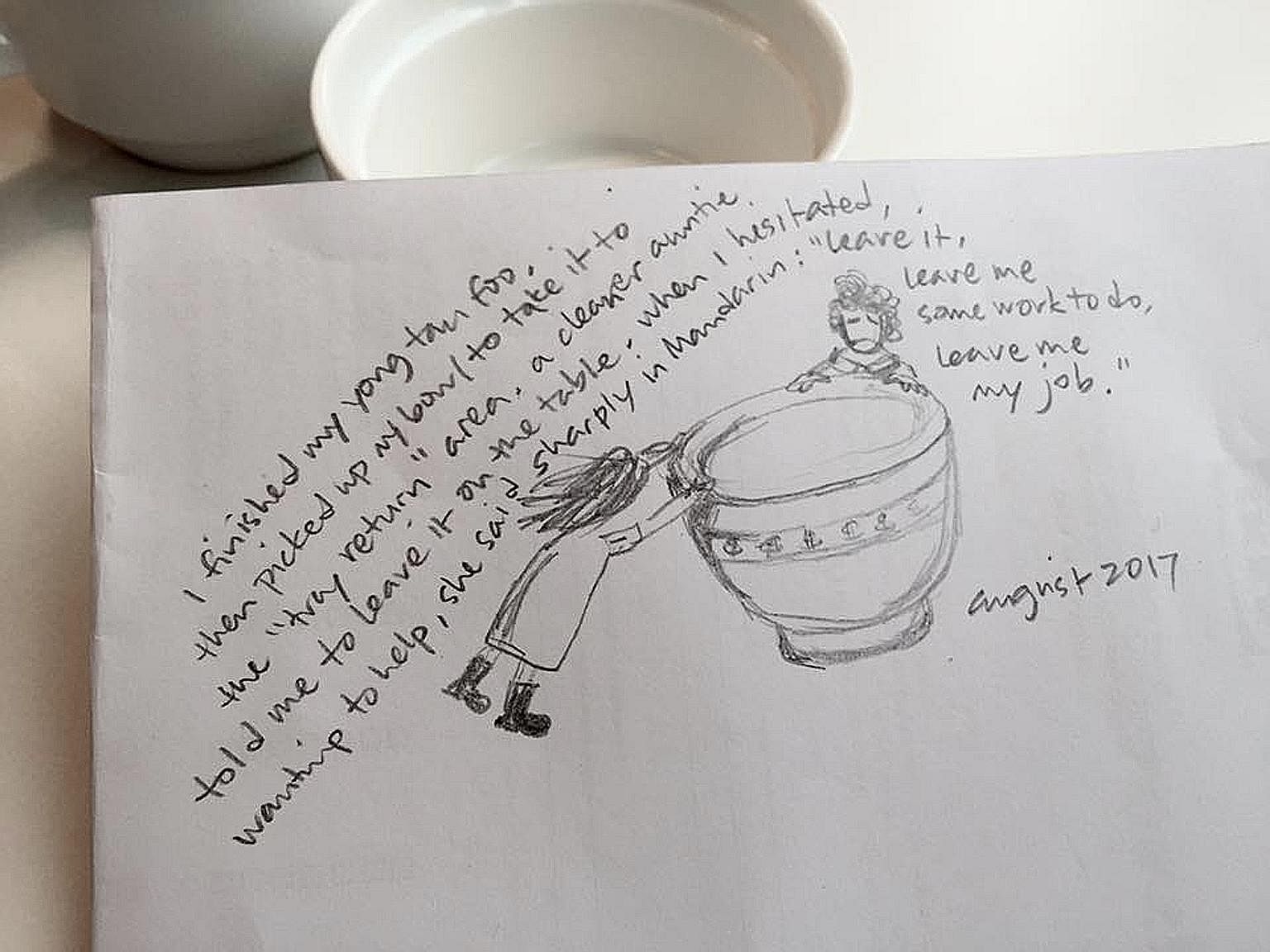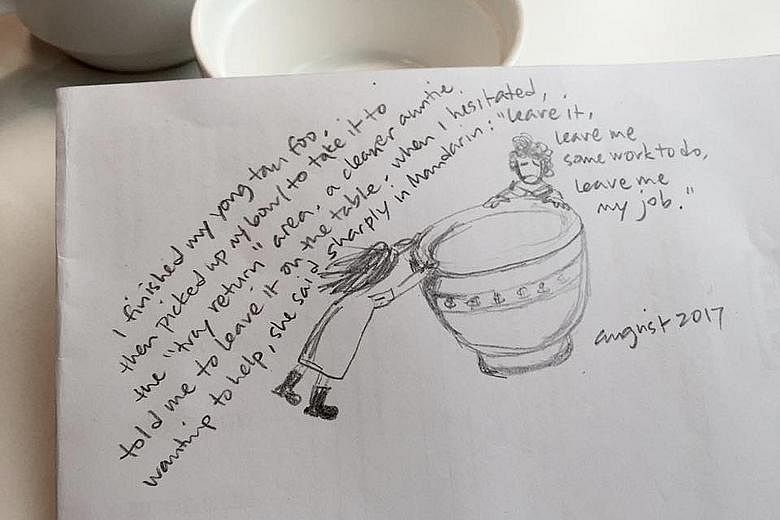"Leave it. Leave it."
I had slurped up my yong tau foo, and was picking up my bowl to take it to the foodcourt tray-return area when a cleaner auntie told me to put it back on the table.
When I hesitated, wanting to help her, she said sharply in Mandarin: "Leave it. Leave me some work to do. Leave me my job."
She didn't mean to be unkind. But when auntie thought her job was under threat from processes like self-service, I understood her urge to hold on to her rice bowl.
However, human hands will probably be a milder threat to auntie than robot ones. We humans can be reliably lazy, leaving messes in foodcourts and hawker centres all over Singapore despite being urged to pick up after ourselves. Food and beverage company Chang Cheng's general manager, Mr Michael Leng, estimated that only half of all customers were willing to return their trays, according to a report published in May by The New Paper.
Gravy splatters, tissues floating in soup, spat-out bones, rice scattered everywhere. Auntie, you have your work cut out for you.

Maybe auntie was more worried about this: Earlier this year, a couple of coffee shops in Tampines and Choa Chu Kang rolled out smart-tech systems. A Chang Cheng one featured technologies like a floor-cleaning robot, a tray-return automation system and a tray-trolley-return robot.
They were the first batch of productive coffee shops under the reviewed tender system for bidders for new coffee shop spaces, reported The Straits Times. More of them, adopting digital solutions to improve their productivity, will be rolled out, with the Government targeting 100 productive coffee shops by 2020.
The New Paper reported that coffee shop chain Koufu, which was already using tray-return smart robots at its outlets in Punggol Plaza and Waterway Point, said man-hours - or auntie-hours - were reduced by half with new technology.
While I think auntie would be feisty enough to smack robots with her rag to try and stop them, her cries of "Leave it. Leave me some work to do" would fall on deaf robot ears.
While the younger and more educated among us can leave old jobs and old ways behind by picking up new skills, what will auntie do when robots wipe tables and wipe industries clean of jobs for people in her position?
MIDDLE/WORKING CLASS, RETRENCHMENT RAGE
I recently picked up a call from a member of the public while a speech by a politician was being televised.
She didn't leave me her name or number.
She did leave me her rage that the subject of jobs did not make up the bulk of what she heard of the speech.
She did leave me her grief that her husband was retrenched.
She didn't mean to be unkind. But with her husband's rice bowl tossed out the office door, I understood her urge to raise her voice, unpleasant though it was for me.
I understood her rage, even though the politician did talk about jobs in his speech.
She was more likely shouting at the wind instead of me, shouting at the winds of change blowing through an economy facing tech disruption from every quarter, in every quarter.
A July Straits Times report read: "Some positive signs emerged in the labour market in the second quarter of this year, with unemployment and layoffs both lower than in the previous quarter.
"However, total employment continued to shrink. Observers said the labour market is 'not out of the woods' yet, as retrenchments are still high and weak job numbers may limit economic growth."
In the report, labour MP and National Trades Union Congress assistant secretary-general Patrick Tay said pockets of layoffs are expected due to disruption, reorganisation and consolidation of businesses.
Who among us will be next to feel the same rage as that caller?
Who will listen to us if we are the next ones to feel the same grief as she has?
Author Yuval Noah Harari wrote in The Guardian recently about artificial intelligence outperforming humans: "Most jobs that exist today might disappear within decades… Many new professions are likely to appear: virtual-world designers, for example... (but) it is unclear whether 40-year-old unemployed taxi drivers or insurance agents will be able to reinvent themselves as virtual-world designers."
It is unclear if cleaner auntie can reinvent herself as a virtual-world designer. If she does so, she may design a virtual mop to give your avatar a whack.
On a more serious note, Chang Cheng did say in a Straits Times report that with smart-tech coffee shops requiring less manpower, staff can be allocated to "more value-added job designations".
'USELESS CLASS', POPULIST RAGE
Last week, a big push to equip workers with basic digital skills was announced. The initiative, SkillsFuture for Digital Workplace, aims to train 100,000 Singaporeans over the next three years in such skills to gain "digital confidence".
What if we can't learn fast and hard enough?
What if there aren't any "value-added jobs" for us in a few decades?
"The crucial problem is creating new jobs that humans perform better than algorithms," wrote Mr Harari. "Consequently, by 2050 a new class of people might emerge - the useless class."
It is an upsetting and provocative term. Well, here's where a once provocative idea called universal basic income could come in.
Mr Harari wrote in a Bloomberg piece that with universal basic income, an institution would "tax the billionaires and corporations controlling the algorithms and robots, and use the money to provide every person with a stipend covering basic needs. The hope is that this will cushion the poor against job loss and economic dislocation, while protecting the rich from populist rage".
This idea has been embraced by much of Silicon Valley and other tech enclaves, in part to offset anxiety that the technology built in these places is killing off people's livelihoods, Fortune said in a report.
"Proponents, like Tesla and SpaceX founder Elon Musk, have argued such payments would be more efficient and less bureaucratic than current welfare programmes." Other supporters include Facebook boss Mark Zuckerberg and Virgin Group founder Richard Branson.
CNBC reported last month that Silicon Valley giant Y Combinator will give thousands of people across two American states cash handouts in its latest basic income trial.
Britain's Independent said last month also that a study found nearly half of Britons would back universal basic income which was "once considered a policy belonging firmly to the radical left". Polling by the Institute for Policy Research at the University of Bath revealed that 49 per cent of 18 to 75-year-olds supported the introduction of the policy.
Finland is in the middle of a two-year pilot study "to see how getting a basic income, rather than jobless benefits, might affect incentives in the labour market", according to The Economist. Mr Olli Kangas, who helped to design and run the study for Finland's national welfare body, noted the process was far harder to implement than expected: "A nightmare."
So what would the cleaner auntie and the angry caller think of it? Can we be comfortable with getting a universal basic income and the free time to do what we want, while being labelled the "useless class"? Who knows what "nightmare" problems may arise from universal basic income itself; time to study the pilot studies.
Leave it. Leave it.
Can we afford to leave thinking about this issue to a later date to take care of today's problems first?
Auntie's sharp words cut deep that day, and made me think about more than just leaving her some work to do.
Maybe it is a warning to leave old work behind for the new, while we still can.
Leave it. Leave it.


